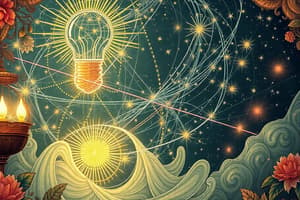Podcast
Questions and Answers
What is energy a measurement of?
What is energy a measurement of?
- The ability of something to stop working
- The ability of something to change
- The ability of something to be measured
- The ability of something to do work (correct)
What can happen to energy?
What can happen to energy?
- It can be created or destroyed
- It can only be stored or transferred
- It can only be measured or observed
- It can only be transferred or transformed (correct)
What is a characteristic of energy?
What is a characteristic of energy?
- It can be observed, stored, and measured (correct)
- It can only be created, not destroyed
- It can only be observed, not measured
- It can only be transferred, not transformed
What is NOT a property of energy?
What is NOT a property of energy?
What is a fundamental principle of energy?
What is a fundamental principle of energy?
What is the primary function of energy?
What is the primary function of energy?
What happens to energy during most energy conversions?
What happens to energy during most energy conversions?
What is energy efficiency a measure of?
What is energy efficiency a measure of?
What is the formula to calculate energy efficiency?
What is the formula to calculate energy efficiency?
What is wasted energy an example of?
What is wasted energy an example of?
Flashcards are hidden until you start studying
Study Notes
What is Energy?
- Energy is the ability of something to do work.
- It is a measurement of the capacity to cause a change or to perform a task.
Characteristics of Energy
- Energy can be observed, making it a tangible phenomenon.
- Energy can be stored, allowing it to be utilized at a later time.
- Energy can take many forms, making it a versatile and dynamic concept.
Energy Conservation
- Energy cannot be created or destroyed, a fundamental principle in physics.
- Energy can only be transferred or transformed from one form to another.
- Energy cannot be lost, it is always conserved in a closed system.
Energy Basics
- Energy is a measurement of the ability of something to do work.
- Energy can be observed, stored, and measured in many forms.
Energy Conservation
- Energy cannot be created or destroyed, only transferred or transformed.
- Energy cannot be lost, it can only be transferred or transformed from one form to another.
Energy Efficiency
- Energy efficiency is a measure of how much input energy is converted into useful output energy.
- Input energy is the energy you start with, while useful energy is the output energy that's desired in the end.
- Energy efficiency formula: (Useful Energy ÷ Input Energy) × 100, with the answer in a percentage.
Energy Waste
- Wasted energy is the output energy that is not wanted or desired.
- Most energy conversions waste some energy, usually in the form of heat (thermal energy).
Studying That Suits You
Use AI to generate personalized quizzes and flashcards to suit your learning preferences.



